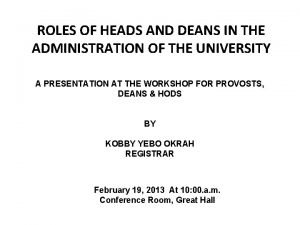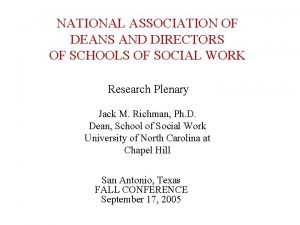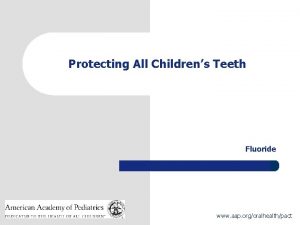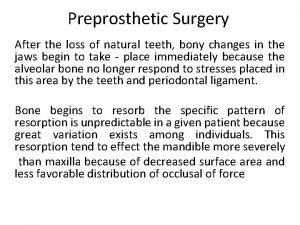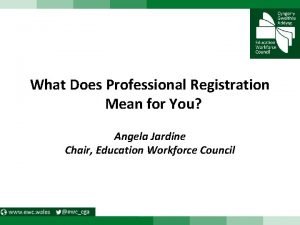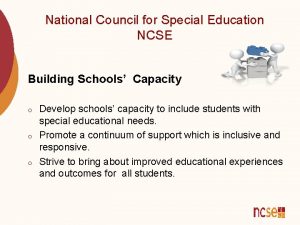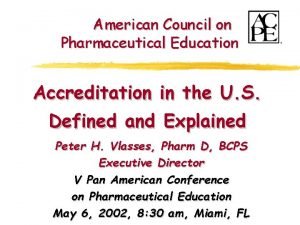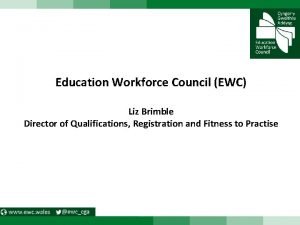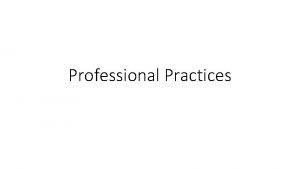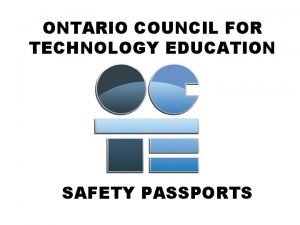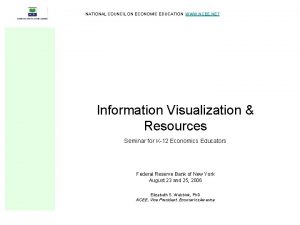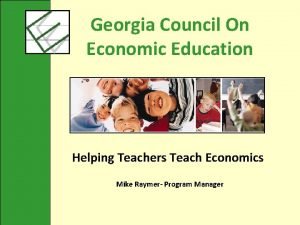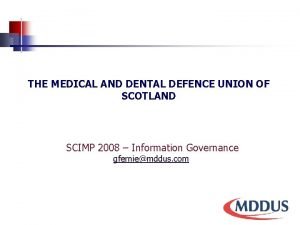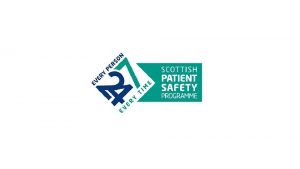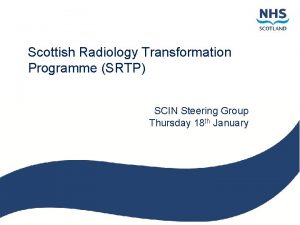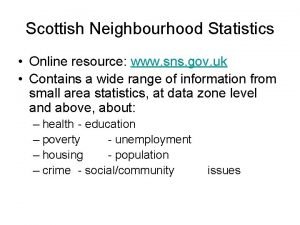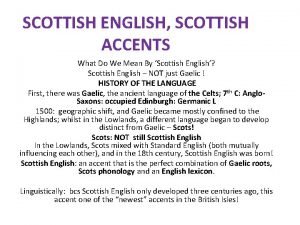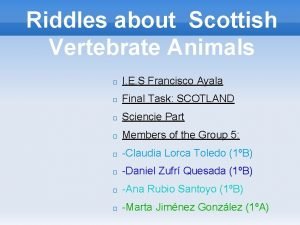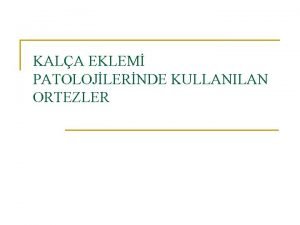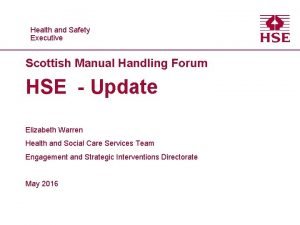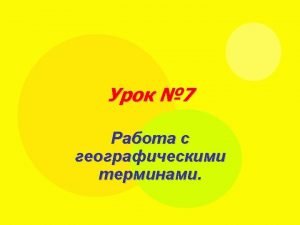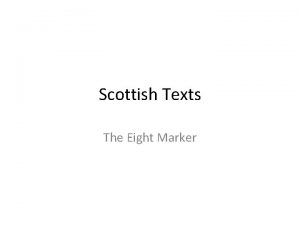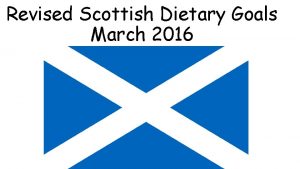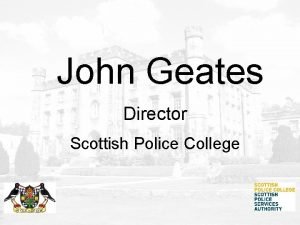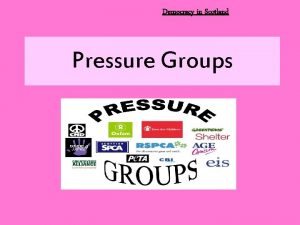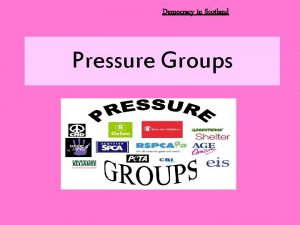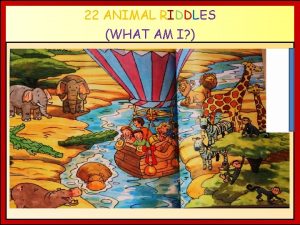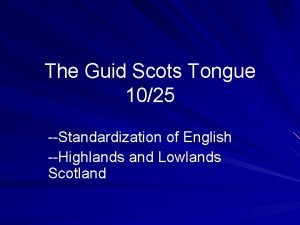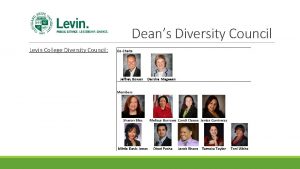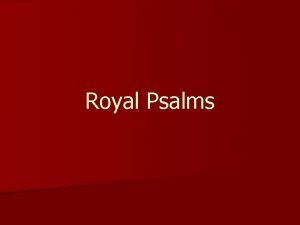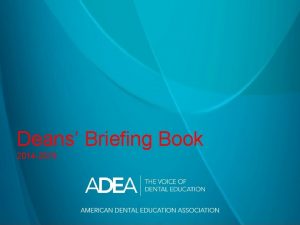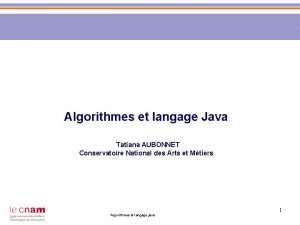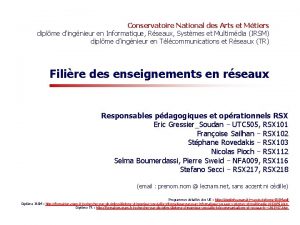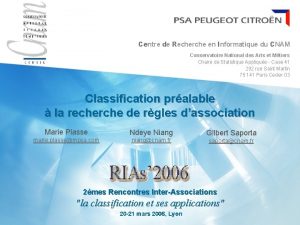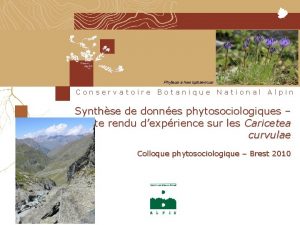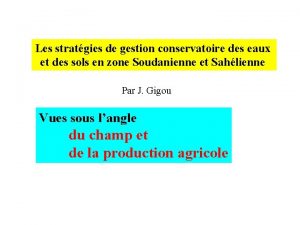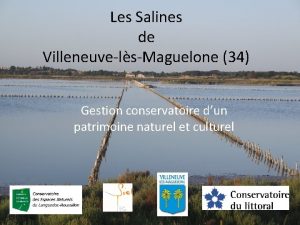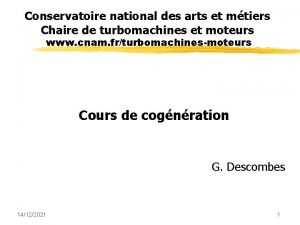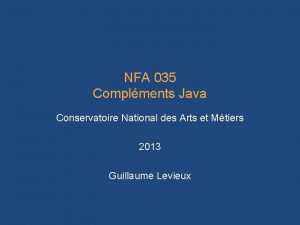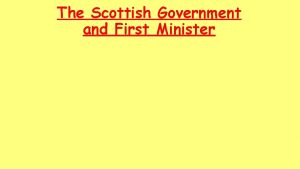Scottish Council of Deans of Education Royal Conservatoire



































- Slides: 35

Scottish Council of Deans of Education Royal Conservatoire of Scotland, Glasgow 19 May 2017 The role and contribution of higher education in contemporary teacher education Ian Menter Emeritus Professor of Teacher Education, University of Oxford

Background • To examine the role and contribution of higher education in contemporary teacher education. The paper will draw on international practices and research and will relate the analysis of these insights to the current Scottish context and to the developments that have occurred since the publication of Teaching Scotland's Future ('The Donaldson Report').

Overview • Introduction • International overview – – Historical perspectives Philosophical perspectives Policy perspectives Conclusion (1) • The Scottish context – Historical perspectives – Recent policy • Looking ahead – Conclusion (2)

Introduction • To insist on the importance of universities' involvement in the preparation of teachers is neither to insist on the status quo nor to diminish the importance of schools in the process. Clearly that involvement is properly fundamental and extensive, and the recognition that schoolteachers and university tutors meet on this ground as equals, with different and complementary forms of understanding and expertise, is the basis for honest and successful cooperation and partnership. Furlong and Smith 1996: 3

Introduction

Introduction • • The effective teacher The reflective teacher The enquiring teacher The transformative teacher Menter et al, 2010 • [Teachers]. . . as reflective, accomplished and enquiring professionals who have the capacity to engage fully with the complexities of education and to be key actors in shaping and leading educational change. Donaldson, 2011: 4


An international overview – historical perspectives • There is a tolerably general agreement about what a university is not. It is not a place of professional education. Universities are not intended to teach the knowledge required to fit men (sic) for some special mode of gaining their livelihood. Their objective is not to make skilful lawyers, or physicians or engineers, but capable and cultivated human beings. J. S. Mill, 1867, St Andrews, cited by Pring, 1996: 15

However…. • Davie – The Democratic Intellect • Collini and Nixon – the humanising element of a university education • In teacher education: ‘universitisation’ and partnership

But… • The trouble with ed schools (Labaree) • ‘Barmy theory’ and ‘the blob’ (Clarke and Gove) • The 'fragile, even febrile, position of teacher education within the university' (Moon, 2016)

Moon (2016): 'Do universities have a role in the education and training of teachers? ' • orientation towards the practical; • research-focused pre-service training; • responsibilities around disadvantage in schools; • active involvement in professional development; • and, alternative routes into teaching.

Two further elements • Europe • Bologna process, Master’s level • but now Brexit • (Murray, 2016) • Research and teaching (BERA-RSA 2014) • • SCRE Stenhouse Goldacre Evidence-based teaching

Final Report May 2014 Research and the Teaching Profession Building the capacity for a selfimproving education system • The importance of research literacy as an entitlement • Clinical practice • England as an outlier in the UK www. bera. ac. uk


Philosophical perspectives • Winch, Orchard and Oancea (2014): 'three interconnected and complementary aspects of teachers' professional knowledge: practical wisdom, technical knowledge and critical reflection'. • 'the type of deeper insight and understanding that comes from interrogating one's practice based on the wider research evidence and making explicit the assumptions and values that underpin it’. • Burn and Mutton (2014): 'research-informed clinical practice[s]’ which 'seek to integrate practical engagement in schools with research-based knowledge in carefully planned and sequenced ways‘ • such approaches ‘do have the potential to make a positive effect on beginning teachers' learning and confidence, but that much depends on the quality of the clinical experience. ’

‘Practical theorising’ • 'both looking for attractive ideas for practice and subjecting these ideas to critical examination' (Hagger and Mc. Intyre, 2006: 58). • Beginning teachers are only likely to be able to answer the more challenging questions 'as a result not only of quite extensive experience and very careful consideration but also through debate with experienced colleagues and through reference to relevant research and scholarship' (ibid, 59).

Insights from research England: • Furlong et al (2000) • Complementary and collaborative partnerships USA: • 'strong relationships, common knowledge, and shared beliefs among school- and universitybased faculty jointly engaged in transforming teaching, schooling, and teacher education' • (Darling-Hammond, 2012: 138 -9).

Australia • SETE findings and analyses suggest that preparing, supporting and retaining high quality early career teachers requires a reconsideration of teacher education across the real and/or perceived divides created by the dichotomies embedded in policy talk globally. It explicitly supports notions that schooling and educating teachers be viewed as a collective responsibility between universities, schools, systems and communities within a newly created real or imagined third space. (Mayer et al, 2015: 20)

Policy perspectives • Tatto: Finland, Singapore, the USA • Australia and Chile, representing the range • TEMAG: Action Now - Classroom from 'excellent' to 'fair' according Ready Teachers - identified some to the OECD categories. weaknesses in provision including 'insufficient integration of teacher • what is notable 'about provision education providers with schools in both Finland Singapore, as and systems'. One of their main compared to the more diverse, recommendations is that 'theory fragmented and market-oriented and practice in initial teacher provision in the USA and Chile, is education must be inseparable the extent to which teachers' engagement with research and mutually reinforced in all enquiry-oriented practice is program components' embedded throughout the education system' TEMAG, 2014: xiii BERA-RSA, 2014: 15

• Australia Action Now: Classroom Ready Teachers

The Teacher Education Group • Five nations: the power of home international study • England as an outlier • Reports, reports • Relationships between research, policy and practice • Teacher Education Group (2016) Teacher Education in Times of Change. Bristol: Policy Press

…England… • Teaching is a craft and it is • We are left in little doubt best learnt as an apprentice that partnership between observing a master schools and universities is craftsman or woman. likely to provide the highest Watching others, and being quality initial teacher rigorously observed yourself education, the content of as you develop, is the best which will involve significant route to acquiring mastery school experience but in the classroom. include theoretical and research elements as well. House of Commons Education Gove, 2010 Committee, 2012: 3

Conclusion (1 a) The role of universities in ITE: i. the analysis of the subject matter to be taught is related to the mode of understanding of those who are to learn; ii. there is a need for centres of expertise which can be put to the service of schools; iii. the training of teachers must take place against a background of relevant and systematic research; iv. the development in. . . schools of the intellectual and researchbased framework within which there can be the exploration and testing of ideas essential to professional preparation require[s] support from those who exemplify such activities; v. the training of teachers must take place within the context of a critical tradition. Pring, 1996: 19 -20

Conclusion (1 b) But also: vi. we need models of ITE which enable beginning teachers to experience theorising of practice - this entails fully integrated models of teacher education, which may well have clinical elements; vii. from the outset, provision needs to be planned in partnership jointly by staff in universities and schools; viii. the partnership provision should extend beyond ITE, to include shared approaches to continuing professional development and educational research, thus creating an extended professional community of practice and enquiry.


Furlong (2013) 'the maximisation of reason': • It is this principle. . that is still at the heart of the idea of the university; it is this principle that can and should be applied to all of our research and to all forms of teaching, be they general or, as is more often the case in education, vocational. Furlong, 2013: 181

The Oxford Education Deanery • The Education Deanery is a knowledge exchange framework within which university–school partnerships in Research, Continuing Professional Development and Initial Teacher Education can be formed and sustained. • Seeing teacher development and learning as a career-long continuum, taking place within an established professional community of practice and enquiry. • Drawing on the wider resources of the University and other partners. • Aiming to support learning of children in schools, with a particular focus on the most disadvantaged

The Scottish context: history • • Chairs in education from 1876 Colleges of Education Universitisation – ambivalence The democratic intellect Education as a key pillar of civic culture The role of GTCS The problem of partnership

Recent policy developments • Sutherland Report 1997 • Two stage review of ITE 2000 (post-Mc. Crone) – First stage consultancy report – Second stage committee recommendations • 2009 Graham Donaldson commissioned (Also Curriculum for Excellence and Mc. Cormac)


Donaldson • ‘The values and intellectual challenges which underpin academic study should extend their own scholarship and take them beyond any inclination, however understandable, to want narrow training of immediate and direct relevance to life in the classroom. ’ Donaldson, 2011: 6 • ‘Scotland's universities are central to building the kind of twenty-first century profession which this Report believes to be necessary. ’ Donaldson, 2011: 104

In the meantime… • Scottish Teachers for a New Era • Glasgow West clinical teacher education model • Responses to Donaldson • Deputy First Minister’s call and proposals from providers

Looking ahead – Conclusion (2) • The evidence reviewed in this paper demonstrates very clearly that simplistic apprenticeship models for the preparation of teachers are very poorly suited to developing creative, critical and reflective professionals of the kind that Graham Donaldson was calling for. • …through the involvement of the universities as a fundamental element of provision, we may continue to see innovation and improvement that will ensure that the teaching profession itself continues to be held in high esteem and that the continuing challenges of overcoming educational disadvantage are directly tackled by teachers and teacher educators who understand these challenges and are equipped with the skills to address them.

Three themes for discussion • 1. Partnership and clinical practice – • what needs to be done to create a genuine community of practice and inquiry across the schools and universities? What is meant by 'integrated', 'complementary', 'collaborative', etc? • 2. The changing nature of teaching in the 21 st century – • what are the key determinants of how teaching is being redefined? Technology, school governance and structures, globalisation? What changes in curriculum, in assessment, in pedagogy are we anticipating and what might the implications be for teacher education? • 3. The distinctiveness of Scottish teacher education – • what might be identified as distinctive in our context and what is worth fighting for?

• ian. menter@education. ox. ac. uk
 Scottish council of deans of education
Scottish council of deans of education Visor osteotomy is used for
Visor osteotomy is used for Cc: all deans and heads
Cc: all deans and heads National association of deans and directors
National association of deans and directors Deans community high school
Deans community high school Ohio deans compact
Ohio deans compact Purina davenport iowa
Purina davenport iowa Indeks fluorosis
Indeks fluorosis Exsostosis
Exsostosis Ncat deans list
Ncat deans list Education workforce council
Education workforce council National council for special education
National council for special education American council on pharmaceutical education
American council on pharmaceutical education Education workforce council
Education workforce council Nceac curriculum
Nceac curriculum Ontario council for technology education
Ontario council for technology education National council for economic education
National council for economic education Georgia council on economic education
Georgia council on economic education Traditional scottish instruments
Traditional scottish instruments The medical and dental defence union of scotland
The medical and dental defence union of scotland Essentials of safe care
Essentials of safe care Scottish radiology transformation programme
Scottish radiology transformation programme Sns statistics
Sns statistics Scottish english vowels
Scottish english vowels Scottish riddle 3 animals
Scottish riddle 3 animals Toronto ortezi
Toronto ortezi Mhra
Mhra Xxx.pussy
Xxx.pussy Scottish set text 8 mark question
Scottish set text 8 mark question Crocodile scottish poem
Crocodile scottish poem Scottish dietary goals 2016
Scottish dietary goals 2016 Scottish police college
Scottish police college Scottish pressure groups
Scottish pressure groups Scottish pressure groups
Scottish pressure groups An animal riddle
An animal riddle Scottish tongue twisters
Scottish tongue twisters


